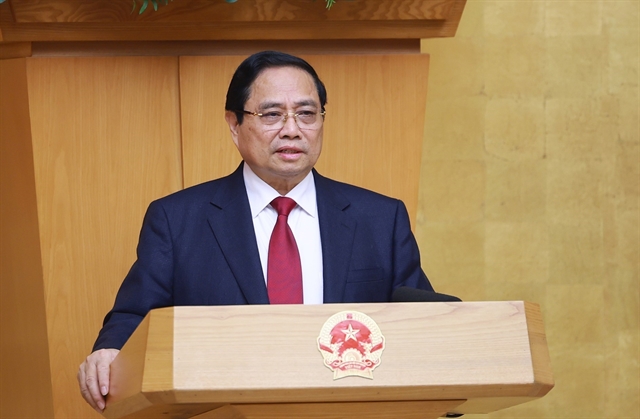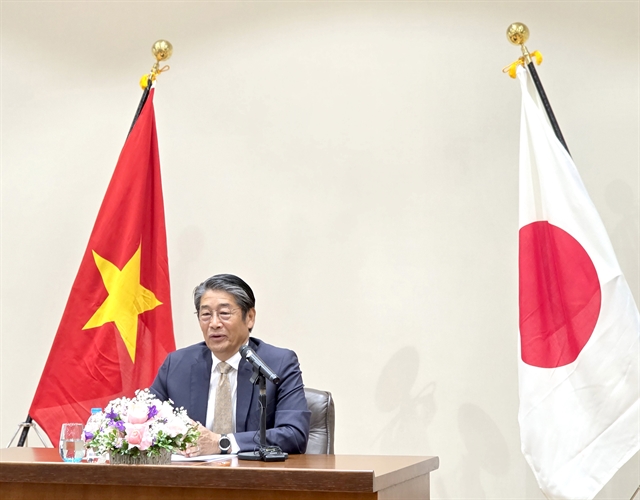 Politics & Law
Politics & Law

 |
| Japanese Ambassador to Việt Nam Naoki Ito addressed local media. — VNS Photo Trọng Kiên |
HÀ NỘI — Japan’s upcoming change in leadership will not affect the country’s commitment to its Comprehensive Strategic Partnership with Việt Nam, Japanese Ambassador to Việt Nam Naoki Ito told the local press in a recent briefing on the 52nd anniversary of diplomatic ties on September 21.
Asked about the potential impacts to bilateral ties from Japanese Prime Minister Shigeru Ishiba’s resignation and the forthcoming election for the presidency of the ruling Liberal Democratic Party, as well as the broader political uncertainty in Japan, the ambassador stressed that, while a new Prime Minister will be chosen, Japan’s policy towards Việt Nam remains steadfast.
“Regardless of any change in the leadership of Japan’s ruling party, Japan will continue to uphold its diplomatic choice of a comprehensive strategic partnership with Việt Nam, which it attaches great importance to," he said.
Ito reiterated that the extensive cooperation between the two sides – particularly in skilled workforce training, strategic infrastructure development, investment expansion, security and defence collaboration and high-level exchanges – will continue to be advanced. Both he and the Japanese Embassy in Hà Nội, he added, would make every effort to sustain and promote these initiatives in the months and years to come.
The ambassador also took time to hail the unprecedented strength of the partnership and pledged Tokyo’s continued commitment to supporting Hà Nội’s reforms and growth in what he called Việt Nam’s “new era”.
He recalled the milestone of November 2023, when ties were elevated to a “Comprehensive Strategic Partnership for Peace and Prosperity in Asia and the World” on the 50th anniversary of relations.
“Our bilateral relationship is now closer than ever before,” he said, adding that the spirit of trust and cooperation reached a new height with Prime Minister Ishiba Shigeru’s official visit to Hà Nội in April this year.
A partner in Việt Nam’s new era
Ito noted that Ishiba’s meetings with top leaders of Việt Nam reaffirmed Japan’s support for Việt Nam’s reform path and rapid economic growth.
“Japan will continue to work as an irreplaceable partner to promote Việt Nam’s further development,” he said.
Five months on from that visit, the ambassador pointed to “clear progress” in multiple areas of cooperation.
Japan is stepping up collaboration in technology and innovation. A flagship joint research programme linking five Vietnamese and five Japanese universities will launch in October, training more than 60 Vietnamese PhD students in semiconductor studies.
Japan has pledged to host 250 Vietnamese doctoral candidates in semiconductors in total, half of Việt Nam’s 2030 target of 500. The Việt Nam–Japan University will also begin a new programme on semiconductor engineering this autumn.
In artificial intelligence, the Japan International Cooperation Agency has teamed up with the Matsuo Laboratory at the University of Tokyo to support training at the Hà Nội University of Science and Technology and the National Innovation Centre. A recent lecture by Professor Yutaka Matsuo in Hà Nội drew around 2,000 participants, signalling intense interest in AI-driven start-ups.
On energy and climate, Japanese companies are preparing investments worth about US$20 billion in offshore wind and LNG power projects, alongside a proposed $300 million loan package to help Việt Nam’s green transition.
Japan continues to play a central role in Việt Nam’s infrastructure development. In August, Hà Nội inaugurated the Yên Xá wastewater treatment plant, the city’s largest, built with $200 million in Japanese ODA loans.
The same day, work began on the North Hà Nội Smart City project, blending Japanese technology and culture. October will see a ground-breaking for Metro Line 2, with hopes to extend it to Nội Bài International Airport.
Economic ties are also expanding. Japan’s cumulative investment in Việt Nam now exceeds $80 billion, while annual bilateral trade is around $50 billion.
Over 2,000 Japanese firms operate in Việt Nam, and surveys suggest 60 per cent plan to expand within two years.
“The reforms championed by General Secretary Tô Lâm are opening favourable opportunities for Japanese businesses,” Ito said, citing steps to simplify administrative procedures and speed up licensing.
Challenges remain, including delayed payments to contractors in major ODA projects and Hà Nội’s plan to restrict petrol motorbikes by July 2026, which Japanese firms fear is too abrupt.
Tokyo has urged clearer roadmaps and more time to prepare and adapt, the ambassador told the press.
He confirmed that Japan and Việt Nam will launch new defence dialogues this year. Foreign ministers will co-chair the bilateral cooperation committee in Hà Nội, while the first '2+2' dialogue at the deputy minister level in foreign and defence affairs will be held in Tokyo. The agenda includes defence industry cooperation, equipment transfer and non-refundable financial assistance for Việt Nam’s Ministry of Defence.
“Within our comprehensive strategic partnership, Japan and Việt Nam will continue to work together to safeguard peace and stability in the region. Japan stands with Việt Nam in writing the next chapter of peace,” Ito said.
Beyond politics and economics, Ito emphasised the foundation of mutual understanding built through cultural and human exchanges. The Japanese Embassy will host 'Visit Japan Night' on September 30 in Hà Nội, promoting destinations from Hokkaido to Kyushu, with performances of the historical play Princess Anio, symbolising early Việt Nam–Japan ties.
Next year, a musical retelling of the same story will premiere in Yokohama with a Vietnamese actress in the lead role. Sports ties are also strengthening, with a cooperation pact between the Japan Football Association and Việt Nam’s VFF, and a planned visit by top Japanese club Kawasaki Frontale in mid-2026.
Tourism is another growth pillar: 710,000 Japanese visited Việt Nam and 620,000 Vietnamese travelled to Japan last year. Both countries aim to raise bilateral tourist flows to two million by 2030. Meanwhile, the Vietnamese community in Japan – already 630,000 strong – is projected to reach one million.
“Japan wishes to continue accompanying Việt Nam in writing a story of peace, with independence, freedom and happiness as its core values,” the ambassador said.
He added that he was honoured and fortunate to attend Việt Nam's two memorable milestones this year: the 50th anniversary of the liberation of the south and national reunification earlier this year, and the 80th National Day on September 2, where he witnessed Vietnamese people's pride in the nation's achievements and belief in the future of the country. — VNS